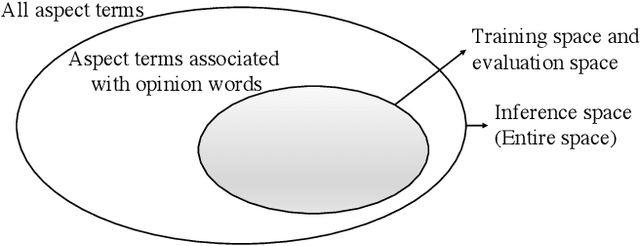Sheng-Hua Zhong
A Better Choice: Entire-space Datasets for Aspect Sentiment Triplet Extraction
Dec 18, 2022



Abstract:Aspect sentiment triplet extraction (ASTE) aims to extract aspect term, sentiment and opinion term triplets from sentences. Since the initial datasets used to evaluate models on ASTE had flaws, several studies later corrected the initial datasets and released new versions of the datasets independently. As a result, different studies select different versions of datasets to evaluate their methods, which makes ASTE-related works hard to follow. In this paper, we analyze the relation between different versions of datasets and suggest that the entire-space version should be used for ASTE. Besides the sentences containing triplets and the triplets in the sentences, the entire-space version additionally includes the sentences without triplets and the aspect terms which do not belong to any triplets. Hence, the entire-space version is consistent with real-world scenarios and evaluating models on the entire-space version can better reflect the models' performance in real-world scenarios. In addition, experimental results show that evaluating models on non-entire-space datasets inflates the performance of existing models and models trained on the entire-space version can obtain better performance.
Training Entire-Space Models for Target-oriented Opinion Words Extraction
Apr 15, 2022



Abstract:Target-oriented opinion words extraction (TOWE) is a subtask of aspect-based sentiment analysis (ABSA). Given a sentence and an aspect term occurring in the sentence, TOWE extracts the corresponding opinion words for the aspect term. TOWE has two types of instance. In the first type, aspect terms are associated with at least one opinion word, while in the second type, aspect terms do not have corresponding opinion words. However, previous researches trained and evaluated their models with only the first type of instance, resulting in a sample selection bias problem. Specifically, TOWE models were trained with only the first type of instance, while these models would be utilized to make inference on the entire space with both the first type of instance and the second type of instance. Thus, the generalization performance will be hurt. Moreover, the performance of these models on the first type of instance cannot reflect their performance on entire space. To validate the sample selection bias problem, four popular TOWE datasets containing only aspect terms associated with at least one opinion word are extended and additionally include aspect terms without corresponding opinion words. Experimental results on these datasets show that training TOWE models on entire space will significantly improve model performance and evaluating TOWE models only on the first type of instance will overestimate model performance.
 Add to Chrome
Add to Chrome Add to Firefox
Add to Firefox Add to Edge
Add to Edge